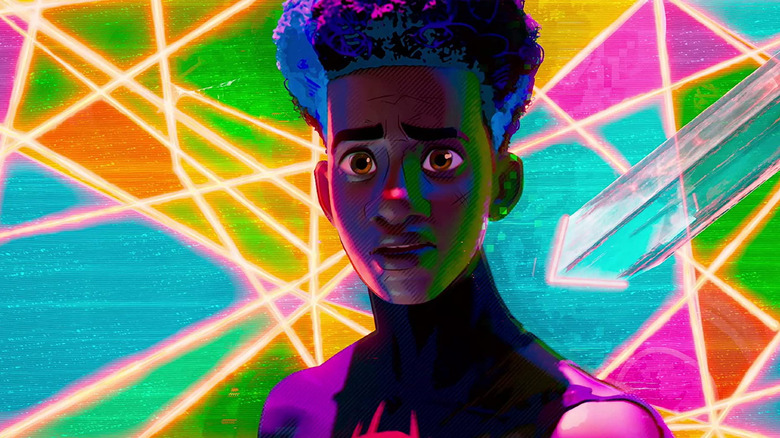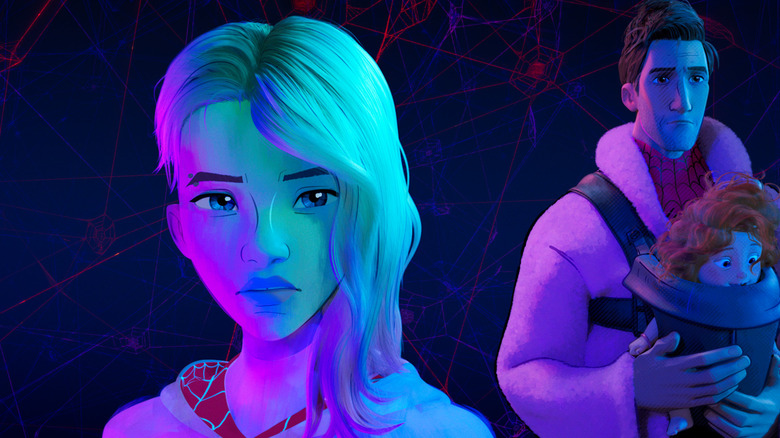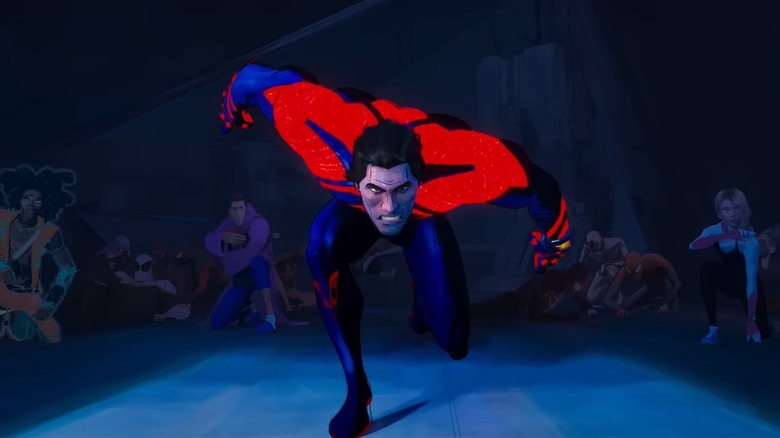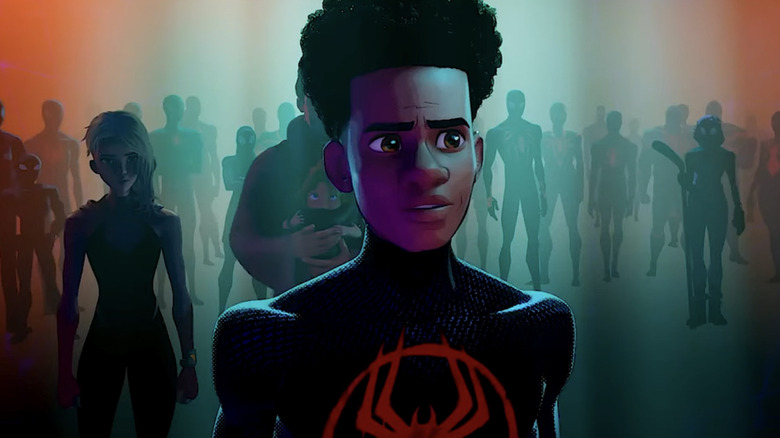Across The Spider-Verse's Most Meta Element Questions Every Other Spider-Man Movie
Are your Spider-Senses tingling? That's because this article is about to discuss major spoilers for "Spider-Man: Across the Spider-Verse." You have been warned!
2018's "Spider-Man: Into the Spider-Verse" had a lot of fun playing around with the idea that — for most fans, at least — if you've seen one "Spider-Man" movie, then you've seen them all. The screenplay relies on a series of recurring gags where various Spider-Mans recount their specific backstories and origins, humorously breezing past all the tropes we ought to know by now (a radioactive spider?? Uncle Ben dies?? WHAT?!) so that the film could get to the really interesting stuff ... including the payoff where Miles Morales (voiced by Shameik Moore) finally narrates his own journey and earns his official comic book cover. The movie passes that baton on to "Across the Spider-Verse," though with one added wrinkle.
As we learn around the midpoint of the sequel, the entire crux of the plot centers on a question that has driven many a Spider-fan conversation over the years.
When Miles' battle with the dreaded The Spot (Jason Schwartzman) results in the destruction of large swaths of Mumbattan, he lands on the radar of the relentless Miguel O'Hara (Oscar Isaac) and his super-cool Spider-Society of interdimensional timeline cops in the worst way. As it so happens, Miles' instinct to save everyone at all costs ends up having unintended consequences on the multiverse. By rescuing the father of Pavitr Prabhakar's (Karan Soni) girlfriend from certain death, Miles prevented him from serving as the tragic motivation for that dimension's Spider-Man India. Essentially, our hero dares to defy the exact same formula of all "Spider-Man" movies ... and, to Miguel, that's a problem.
This very issue represents the most fascinating — and most meta — aspect of "Across the Spider-Verse."
The burden of responsibility
Being a superhero means being synonymous with loss. No matter how hard he tries, Superman can never save Pa Kent. Batman, for all his fancy gadgets and fabulous wealth, has never managed to come to terms with the deaths of his parents. And Spider-Man? Everyone knows that Spider-Man simply has to lose a father figure in traumatic circumstances if he ever want to become the hero he was meant to be.
But have we ever stopped to ask ourselves why that's the case?
That appears to have been the elevator pitch for "Spider-Man: Across the Spider-Verse," which has Miles wrestle with this very concern. During a massive exposition dump in Miguel O'Hara's Nueva York headquarters, Spider-Man 2099 reveals that he and his legion of Spider-Society members have been working tirelessly to reduce interdimensional incursions and interfering with events — like saving someone who was "supposed" to die — that could tear the entire fabric of reality apart. This sobering information is accompanied by stunning, impressionistic visuals that emphasize how certain events in the lives of each dimension's respective Spider-people can't be avoided. Peter B. Parker (Jake Johnson) has to watch Uncle Ben die. Gwen needs to accept that her father, Captain Stacy, is doomed. And Miles must learn to let go of his late Uncle Aaron (Mahershala Ali) and, as it turns out, his own father Jefferson (Brian Tyree Henry).
Both Gwen and Peter B. try to gently explain to Miles that sacrifice and tragedy are intrinsic elements of putting on the Spider-Man mask. Attempting to rewrite fate, as Miguel once inadvertently did by replacing one of his own dimensional selves in a happier universe, will only have the most dire of consequences.
But for once, our Spider-Man refuses to stand by and let that happen.
Breaking the canon
With "21 Jump Street" and "The LEGO Movie" masterminds Chris Miller and Phil Lord credited as co-writers on the screenplay (along with Dave Callaham), it should come as no surprise that "Across the Spider-Verse" would comment directly on the "Spider-Man" franchise overall, predominantly through its main antagonist Miguel O'Hara.
As the tortured and deeply broken Spider-Man 2099 explains to our heroes, the act of interfering with events in other dimensions is known as "breaking the canon." Of course, that phrase functions both as an easily understandable piece of world-building lingo and as a cheeky reference to the state of "Spider-Man" movies in general. And by having the film's true villain (with all due respect to The Spot, Miles' wannabe nemesis) actually verbalize such a provocative phrase in dialogue, it becomes crystal clear just how much "Across the Spider-Verse" is attempting to reflect upon its place in this franchise.
When you boil the film down to its essentials, Miles upends the established order (to the delight of Daniel Kaluuya's punk-rock Hobie) in the final act by refusing to play along with Miguel's hardline rules and the overriding ethos that every Spider-person has no choice but to allow their closest loved ones to die for the greater good. What's one life when balanced against countless others when the fate of the multiverse is at stake, after all? This classic trolley problem gets right to the heart of every great Spidey story, but it also puts a spotlight on the fact that most "Spider-Man" movies have been, well, rather formulaic.
Thankfully, "Across the Spider-Verse" poses the radical idea that there's nobody better equipped than Miles Morales to dramatically shake things up when we need it the most.
The Miles of it all
For years, general audiences only ever knew Spider-Man as the same, comfortably middle-class, unmistakably white character that comic legends Steve Ditko and Stan Lee first created back in the early 1960s. 2018's "Into the Spider-Verse" finally brought an end to that era, giving viewers an even more relatable web-crawler and allowing casual fans to catch up to what comic book nerds have known for years: that Miles Morales is every bit as compelling, textured, and multidimensional as Peter Parker. For the first time on the big screen, the idea that "anyone can wear the mask" finally felt true.
But "Across the Spider-Verse" goes even further, making the (largely accurate) case that the franchise must evolve or die. Whether or not this was the stated intention of directors Joaquim Dos Santos, Kemp Powers, and Justin K. Thompson, it can't help but come across that both "Spider-Verse" movies to this point have disrupted the usual formula for "Spider-Man" movies forever. Consider that, only years after Sam Raimi spelled out the classic origin story for Tobey Maguire's Peter Parker, we had to go through that all over again with both Andrew Garfield and Tom Holland's versions. As great as those original movies undeniably are, they also had the side effect of setting the mold and casting a long shadow that neither Marc Webb nor Jon Watts could escape.
But by dropping the bombshell on Miles that he's the "original anomaly" and the main reason why the first two movies of this new trilogy have featured the near total destruction of the multiverse, "Across the Spider-Verse" turns the obvious into actual text. Miles is a much-needed disruptor, a canon-breaking presence, and a shining example for the potential of what the future of "Spider-Man" movies can be.



